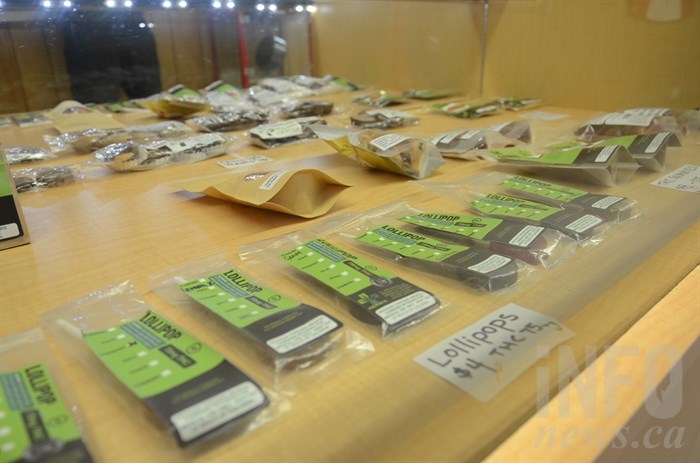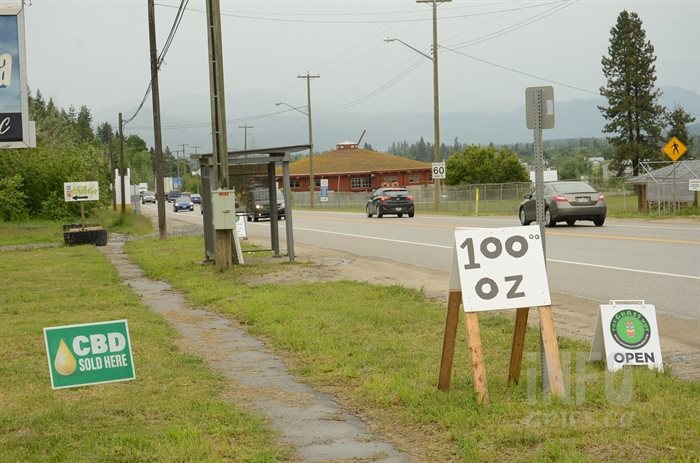'Slap in the face': Province says it won't act against unlicensed pot shops on reserves

More than three years after marijuana legalization, the provincial government has confirmed that it won't take action against unlicensed pot shops operating on First Nations land without their permission.
A recent letter from the B.C. Minister of Public Safety Mike Farnworth spells out the government's position on unlicensed pot shops operating on reserves.
"Undertaking enforcement action on First Nations land without the support of community leadership will likely lead to issues being litigated and strain relations with First Nations communities," the letter reads. "Even more, this approach is unlikely to achieve compliance and Indigenous participation in the legal cannabis industry."
"It's a slap in the face," Okanagan Cannabis Collective spokesperson Mariana Wolff told iNFOnews.ca, describing the government's position as "disheartening."
The government's position is also a U-turn from earlier when it said its Community Safety Unit would be enforcing the law across the board.
Since the beginning of marijuana legalization, a spate of unlicensed stores on First Nations land has been a thorn in the side of licensed cannabis retailers who pay big bucks and jump through plenty of regulatory hoops to obtain licenses to open cannabis stores.
Cannabis stores on First Nations land however have skirted provincial approval and simply set up shop completely unregulated.
And at least on some First Nations land, the vast majority of the cannabis stores aren't owned or operated by Indigenous people.
READ MORE: Splatsin cannabis store closing; band leadership blamed for oversaturated market
"We disagree with the position the province has taken," Wolff said. "Enforcement action should be enacted because it's setting a really awful precedent."
Minister Farnworth's letter continues to say:
"I can advise that the (community Safety Unit) is engaging directly with First Nations communities with a goal of obtaining compliance and support for the legal and regulatory framework."
But while the Minister talks of compliance, around 35 unlicensed cannabis stores operate on First Nations land around the Shuswap and Okanagan with no obvious signs of any change.
Anyone that's driven through the Okanagan Indian Band on the west side of Okanagan Lake will have seen around a dozen stores, many well-established, dotted along the road. The situation north on Highway 97A outside Enderby is much the same.
However, in a statement to iNFOnews.ca the Ministry of Public Safety and Solicitor General said that the Community Safety Unit had received cooperation and support from several First Nation communities to carry-out inspections and seizures of cannabis from unlicensed retail and production facilities operating on reserve.
The statement doesn't clarify where in the province this took place, but it doesn't appear to have been in the Okanagan.
Prince George Liberal MLA Mike Morris sees the provincial government's argument that taking enforcement action could lead to lengthy litigation as a cop-out.
"Government has no role to play in determining whether they should approach a case or not based on the fact that it might go to court," Morris told iNFOnews.ca. "If somebody is operating in a criminal fashion in British Columbia, take them to court, if they're innocent let the courts determine that."
Morris said that if the matter was taken to court it might clarify the issue.
"If we don't follow the letter of the law then things become cloudy and nobody knows where the goalposts are anymore," Morris said. "That's what government should have done right at the beginning. The further we go down this road the more muddled everything becomes until somebody ends up going to jail because the government didn't make the laws clearer in the beginning."
READ MORE: This Okanagan collective is leading the fight for survival for private cannabis stores in B.C.
While nothing has been filed in court, it's rumoured that some licensed cannabis stores are looking at taking legal action against the province because of its lack of enforcement.
In the statement to iNFOnews.ca, the Ministry says it's committed to reconciliation and building positive relationships with Indigenous governments and "these efforts are balanced against the need to ensure that the legal and regulatory framework for cannabis is implemented across the Province and in alignment with federal laws."
Speaking anonymously, one cannabis store owner said it showed the province was applying the law in an inequitable way.
"There's nothing in the Cannabis Act both provincially or federally that allows for that to occur," he said. "The province is actually breaking the law (by) not doing its job."
The province also says its actions respect local Indigenous interests amid ongoing reconciliation efforts.
But the Okanagan Cannabis Collective says it doesn't see why it has to bear the brunt of those reconciliation efforts.
"By not enforcing that, they are just opening the door to more people that are non-indigenous using that loophole and trying to make some small partnerships with some individuals in certain First Nations bands and (are) benefitting that way by not having to pay tax," Wolff said.
And for those non-Indigenous cannabis store owners going into partnerships with Indigenous landowners and skirting the regulations the awards appear to be very fruitful.
A recent B.C. Supreme Court case between Indigenous Bloom and the Tseycum First Nation Band gives a glimpse into the money involved in such partnerships.
Court documents say the Indigenous Bloom store set up on the small First Nation's land on the Saanich Peninsula was bringing in around $30,000 in profit a month.
According to the court documents, Indigenous Bloom went into partnership with the Band paying them $2,000 a month in rent and investing almost half a million dollars to get the store up and running. They also agreed to a standard split of 51% of profits to the band and the rest to Indigenous Bloom. However in that instance, the parties had a disagreement, relationships soured and both sides ended up in court after the Tseycum First Nation took over the store and evicted Indigenous Bloom.
While the government told iNFOnews.ca that it "recognizes that legally operating cannabis retailers are impacted by those unlicensed cannabis retailers that are in operation" it doesn't appear that anything is likely to change in the future.
READ MORE: Legal cannabis: What we know and don’t know about the impact after 3 years
To contact a reporter for this story, email Ben Bulmer or call (250) 309-5230 or email the editor. You can also submit photos, videos or news tips to the newsroom and be entered to win a monthly prize draw.
We welcome your comments and opinions on our stories but play nice. We won't censor or delete comments unless they contain off-topic statements or links, unnecessary vulgarity, false facts, spam or obviously fake profiles. If you have any concerns about what you see in comments, email the editor in the link above.




